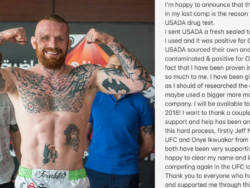The trouble with Ostarine: Jimmy Wallhead’s
16th March 2018
Features


USADA announced today that UFC® athlete, George Sullivan, of Red Bank, N.J., has accepted a one-year sanction for an anti-doping policy violation after declaring the use of a prohibited substance contained in a product that was inaccurately labeled. Although Sullivan did not test positive for any prohibited substances, under the UFC Anti-Doping Policy, the admission of use of a prohibited substance or product containing a prohibited substance is regarded as an anti-doping policy violation.
Sullivan, 35, declared the use of Insulin-like Growth Factor-1 (IGF-1) on his sample collection paperwork when describing his use of a deer antler velvet product during an out-of-competition test conducted on July 13, 2016. IGF-1 is a prohibited substance in the class of Peptide Hormones, Growth Factors, Related Substances, and Mimetics, and prohibited at all times under the UFC Anti-Doping Policy, which has adopted the World Anti-Doping Agency (WADA) Prohibited List.
Following Sullivan’s declaration, USADA initiated an investigation regarding the product declared by Sullivan on his sample collection paperwork. During the course of that investigation, Sullivan provided USADA with information about the supplement product he was referring to when he declared IGF-1.
Although no prohibited substances were specifically listed on the Supplement Facts label, the manufacturer claimed on the product website that each bottle of the product contains an extremely high concentration of IGF-1. Detailed analysis subsequently conducted by the WADA-accredited laboratory in Salt Lake City, Utah, confirmed the presence of IGF-1 in the product, which has since been added to the list of high risk supplements maintained on USADA’s online dietary supplement safety education and awareness resource – Supplement 411 (www.supplement411.org).
Under the UFC Anti-Doping Policy, as well as the World Anti-Doping Code, an athlete’s period of ineligibility for using a prohibited substance may be decreased if the athlete lacks significant fault for the anti-doping policy violation. In this instance, USADA determined that Sullivan’s reduced degree of fault and his forthright declaration of the product at issue justified a reduction to one year from the maximum two-year period of ineligibility. Sullivan’s one-year period of ineligibility began on January 31, 2016, the day after his most recent UFC bout.
• This media release was originally published by the Ultimate Fighting Championship (UFC) and the US Anti-Doping Agency (USADA) on 8 November 2016. To access the original, please click here.
USADA announced today that Grace Bowlby, of Edina, Minn., an athlete in the sport of...
The International Tennis Integrity Agency (ITIA) have confirmed that six Moroccan tennis players have been...
On Aug. 28, 2021, Svetlana Kubyshkina provided an out-of-competition urine sample that contained methenolone and...